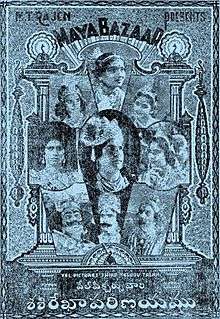Mayabazar (1936 film)
Mayabazar (also known as Sasirekha Parinayam) is a 1936 Indian Telugu-language fantasy film directed by P. V. Das and produced by Vel Pictures. The story is an adaptation of the folk tale Sasirekha Parinayam, which in turn is based on the epic Mahabharata.
| Mayabazar | |
|---|---|
 Poster | |
| Directed by | P. V. Das |
| Based on | Sasirekha Parinayam |
| Starring | Yadavalli Nageswara Rao S.P. Lakshmana Swamy Rami Reddy Santhakumari |
Production company | Vel Pictures |
Release date |
|
| Country | India |
| Language | Telugu |
Cast
As per the Hindu article:[1]
- Yadavalli Nageswara Rao as Krishna
- S. P. Lakshmana Swamy as Abhimanyu
- Rami Reddy as Ghatotkacha
- Santhakumari as Sasirekha
Production
Das chose stage actor Yadavalli Nageswara Rao to portray Lord Krishna. Master Saluri Rajeswara Rao who was introduced in Srikrishna Leelalu (1935) portrayed the younger version of Abhimanyu while S.P. Lakshmanaswamy portrayed its elder version. Rayapralu Subrahmanyam and Rami Reddy were selected to portray Duryodhana and Ghatothkacha respectively.[1]
While searching for the actress to portray the role of Sasirekha, P. V. Das found Subbamma at a school teaching music. Though her parents was initially against her decision to enter acting, they later relented.[1] Subbamma was rechristened as Santhakumari.[2]
Soundtrack
The song "Vivaha Bhojanambu" which became popular in the 1957 version of Mayabazar, was originally composed in this film. It was heavily based on lyrics from Surabhi Nataka Samajam's 1950s plays.[1] That song's melody was inspired by Charles Penrose's 1922 song "The Laughing Policeman", written by Penrose under the pseudonym of Charles Jolly.[3]
References
- Narasimham, M. L. (26 December 2010). "Mayabazaar (1936)". The Hindu. Archived from the original on 15 February 2015. Retrieved 24 January 2017.
- Narasimham, M. L. (20 October 2000). "Unforgettable screen mother". The Hindu. Archived from the original on 24 January 2017. Retrieved 24 January 2017.
- "Copy Cat Crown (Part 5) – Copy Cats Of The Yore". Cinegoer. 8 November 2006. Archived from the original on 15 February 2015. Retrieved 24 January 2017.